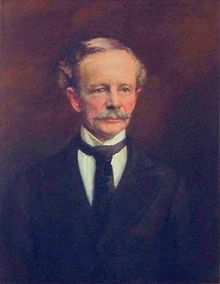George William Brown
|
The Honorable George W. Brown |
|
|---|---|
 |
|
| 20th Mayor of Baltimore | |
|
In office November 12, 1860 – September 12, 1861 |
|
| Preceded by | Thomas Swann |
| Succeeded by | John C. Blackburn |
| Personal details | |
| Born |
October 13, 1812 Baltimore, Maryland, U.S. |
| Died | September 8, 1890 (aged 77) Lake Mohonk, New York, U.S. |
| Political party | Constitutional Union |
| Spouse(s) | Anna Maria Brune (m. 1839; d. 1890) |
| Children | Arthur John Frederick Ellen Mary |
| Alma mater | University of Maryland (SL) |
| Profession | Judge, academic |
| Religion | Episcopalian |
George William Brown (October 13, 1812 – September 8, 1890) was an American politician, judge and academic. He was mayor of Baltimore from 1860 to 1861, professor in University of Maryland School of Law, and 2nd Chief Judge and Supreme Bench of Baltimore City. He was founder and president of the Bar Association of Baltimore City and the Library Company of the Baltimore Bar.
Brown was admitted to the bar in 1834. Brown was a founder of the Library Company of the Baltimore Bar (1840) and from 1861 to 1874, he was its president. He was a founder of the Maryland Historical Society in 1844. The first digest of Maryland Court of Appeals decisions was compiled with his assistance and published in 1849. Brown was mayor of Baltimore, Maryland from 1860 to 1861 and a delegate to the Constitutional Convention in Baltimore in 1867. From 1871 to 1873, he was a University of Maryland School of Law professor from 1871 to 1873. He was elected in 1872 to serve as 2nd Chief Judge, Supreme Bench of Baltimore City, a position he held from 1873 to 1888. He was founder (1880) and 11th president of the Bar Association of Baltimore City from 1889-1890.
Brown played an important role in controlling the Pratt Street Riot, where the first bloodshed of the Civil War occurred, on April 19, 1861. During the riot, Brown accompanied a column of the Sixth Massachusetts regiment through the streets. When the column he was leading was assailed by the mob, "the mayor's patience was soon exhausted, and he seized a musket from the hands of one of the men and killed a man therewith."Immediately following the Riot, Baltimore saw much lawlessness, as citizens destroyed the offices of pro-Union German newspapers and looted shops in search of guns and other weapons. Mayor Brown and Maryland businessmen visited the White House to urge President Abraham Lincoln to reroute Union troops around Baltimore city to Annapolis to avoid further confrontations that they felt would result from additional troops passing through the city.
In the few days following the Pratt Street Riot, Governor Hicks likely assented to Mayor Brown's decision to dispatch the Maryland militiamen to destroy the railroad bridges over the rivers north of the city, to prevent more troops from passing through Baltimore. This was an act both Hicks and Brown would later deny—though Isaac Ridgeway Trimble, commanding Baltimore militia companies immediately following the Riot—later claimed that Brown authorized destruction of the railroad bridges, which may explain Brown's later arrest and imprisonment by federal authorities. Shortly thereafter, a Maryland militia captain and Baltimore County farmer, John Merryman, was arrested, held at Fort McHenry and later denied a writ of habeas corpus, on grounds that President Lincoln had suspended the writ (but only along rail lines in Maryland). This arrest sparked the case of Ex parte Merryman.
...
Wikipedia
